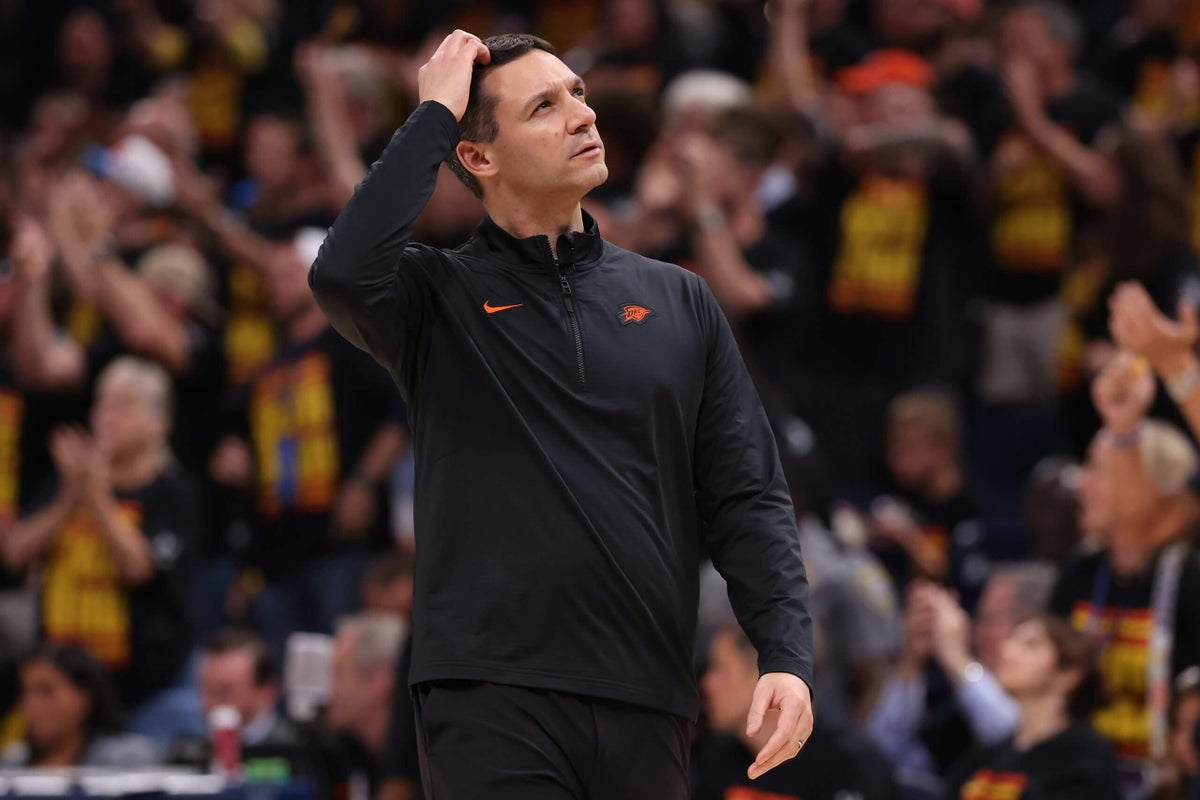

OKLAHOMA CITY — One small adjustment could have saved the Oklahoma City Thunder from coughing up Game 1 of their second-round series against the Denver Nuggets on Monday night.
Yet the Thunder were so committed to their season-long philosophy that in the heat of the moment, a possible game-saving audible didn’t even cross the players’ minds until the question was raised in the postgame news conference.
Advertisement
“Damn, I didn’t think about that,” Thunder guard Jalen Williams said under his breath at the podium.
MVP finalist Shai Gilgeous-Alexander, sitting to Williams’ right, added, “Me either. It’s a good point.”
In a game the Thunder controlled throughout, the Nuggets stole a 121-119 win and home-court advantage because the Thunder spent the final 12 seconds unnecessarily extending the contest. Oklahoma City intentionally fouled the Nuggets twice in the final 12 seconds while ahead by three. Both times, the Thunder’s game plan was to not allow a game-tying 3-pointer. It’s the trusted strategy that has worked in the past for them. This time, though, they misread a moment that might have made all the difference.
It happened on the second intentional fouling sequence. Gilgeous-Alexander had just busted the Nuggets’ coverage for an uncontested dunk to put the Thunder back on top by three with 11.1 seconds remaining. That’s when the Thunder should have re-evaluated their approach.
Nuggets star Nikola Jokić had just subbed out after sinking a pair of free throws before Gilgeous-Alexander’s basket. He’d been carrying five fouls since just under the seven-minute mark. And with no timeouts remaining, the Nuggets couldn’t sub him back in.
Until Thunder guard Alex Caruso immediately fouled Aaron Gordon.
The decision ensured the Nuggets couldn’t attempt a game-tying 3, but only 0.4 seconds ticked off the game clock when Caruso delivered the foul.
“I probably could have let Gordon dribble a couple of more times, run some more time off the clock,” Caruso said. “But at the same time, we’ve talked about, ‘When in doubt, just make sure you get the foul done.’”
Jokić’s inability to return was the biggest reason the Thunder would have been wise to play on following Gilgeous-Alexander’s dunk. But there were more.
Denver shot just 10-of-32 on 3-pointers Monday, a 31.3 percent rate that marked the Nuggets’ second-worst percentage from that distance this postseason. Nuggets sharpshooter Michael Porter Jr., after a two-point, 1-of-8 shooting effort, was benched in favor of former Thunder guard Russell Westbrook throughout the fourth quarter. Westbrook, who shot 1-of-5 on 3s, was in the game over Porter and Jokić when Caruso intentionally fouled Gordon. The Thunder could have let the possession play out and forced anyone other than Jokić to make a play. Instead, they gifted Denver two freebies with hardly any time elapsing.
Advertisement
“The fouling up three, that’s on me,” Thunder coach Mark Daigneault said. “I think giving the foul and getting the foul executed is critical. So if there is something to be learned from that, it’s probably giving it too early on my part. But that’s not on the players. They’re executing what I’m telling them to do.”
But what do you do when what you’re coached to do is not the best thing? That’s the question Gilgeous-Alexander and Williams acknowledged was a doozy.
“It’s hard now because we lost, and it’s going to seem like we should have did the other thing obviously because what we did led to a loss,” Gilgeous-Alexander said. “But we’ve been in that situation before, we’ve fouled, and we’ve won the game. And tonight, it didn’t go in our favor.”
Another reason the Thunder might have wanted to reconsider extending the game was their own foul shooting. After leading the league in free-throw percentage in the regular season at 81.9 percent, they went 20-of-28 on free throws, and their last two attempts were costly. Chet Holmgren received the ensuing inbounds pass from Caruso following Gordon’s two made foul shots with the chance to push OKC’s lead back to three with 9.5 seconds left. He was fouled and missed both free throws.
It led to a game-winning 3 by Gordon off a drive and kick from Westbrook with 2.8 seconds remaining.
“What are the percentages chance of Chet missing two free throws and then Gordon making a contested, above-the-break 3 for game?” Caruso asked. “It probably is in our favor, and yet it didn’t happen for us.”
Other factors contributed to the Thunder blowing an 11-point lead with 4 1/2 minutes to play: offensive stagnation down the stretch; poor defensive rebounding, which allowed Denver 27 second-chance points fueled by 21 offensive rebounds; and, of course, Jokić’s monster 42-point, 22-rebound, six-assist night. OKC also allowed 24 fast-break points and gave up 71 second-half points.
Advertisement
It all played a part in the anatomy of the Game 1 giveaway and revealed the gulf between the two clubs in experience.
But no stretch stung the Thunder more than the final 12 seconds.
“You don’t want to be in that position,” Caruso said. “You do stuff well enough the minutes leading up to that, and you don’t have to worry about the last 10 seconds. And a lot of focus goes into that strategy to foul up three and how we executed it and all that, but the game wasn’t won or lost in the last 15 seconds. We had plenty of opportunities before that to win the game.”
(Photo of Thunder coach Mark Daigneault: Sam Hodde / Getty Images)
This news was originally published on this post .




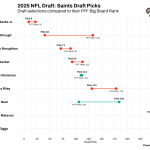

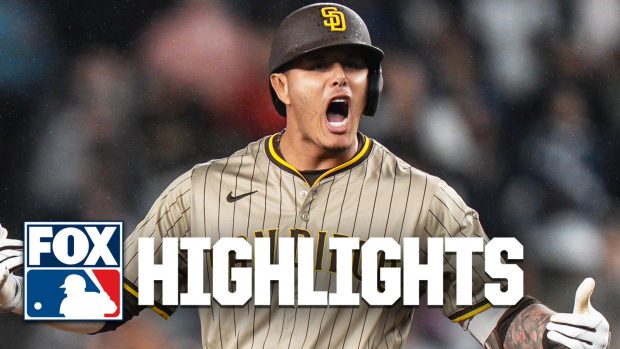
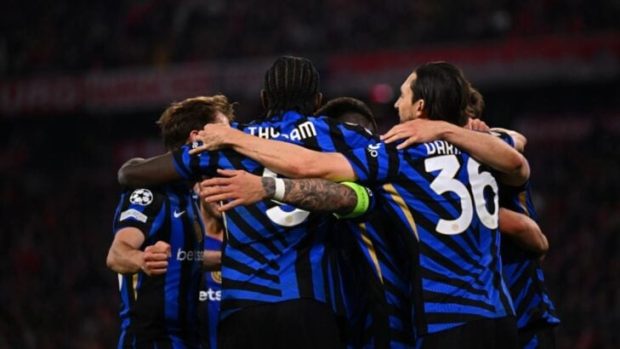

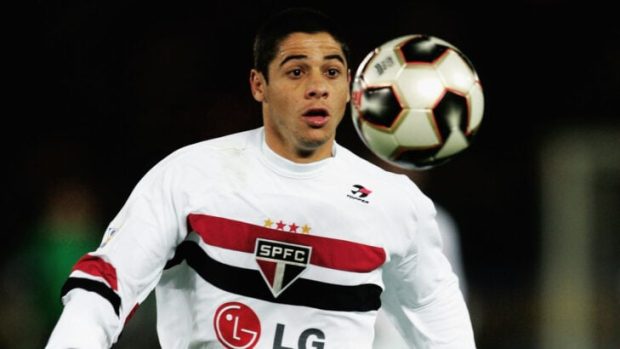
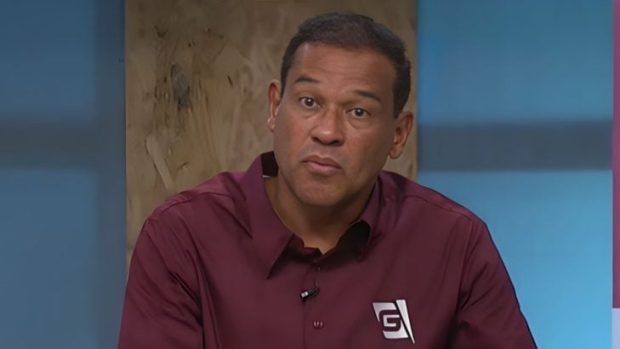
Be the first to leave a comment